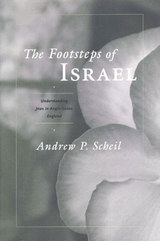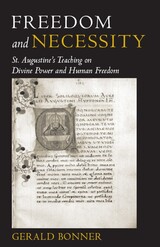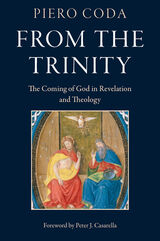158 books about History of doctrines and 3
start with F
158 books about History of doctrines and 3
158 books about History of doctrines
3 start with F start with F
3 start with F start with F

The Footsteps of Israel
Understanding Jews in Anglo-Saxon England
Andrew P. Scheil
University of Michigan Press, 2004
"This innovative, well-researched study looks at anti-Judaic rhetoric in the Old English and Latin texts of Anglo-Saxon England-a land lacking real Jews. The author isolates a common pool of inherited images for portraying the Jew, and teaches us to hear, especially in the vernacular, their increasingly dark and disturbing inflections."
---Roberta Frank, Yale University
"The Footsteps of Israel is a fascinating study of a pervasive stereotype. Scheil's analysis of how Jews, with no real physical presence in Anglo-Saxon England, captured the imagination of writers of the period, is a superb achievement."
---Louise Mirrer, President and CEO, New-York Historical Society
"The elegance of Scheil's prose weaves a unifying thread through the vast literary and historical tapestry he presents, moving with grace from Latin to Old English, from Bede to later authors, from Wordsworth and Blake to modern writers. He speaks elegantly of these texts' conversations with the past, and the Jews emerge as both enemies and spiritual antecedents of the 'New Israel' of Anglo-Saxon England."
---Stephen Spector, State University of New York, Stonybrook
Jews are the omnipresent border-dwellers of medieval culture, a source of powerful metaphors active in the margins of medieval Christianity. This book outlines an important prehistory to later persecutions in England and beyond, yet it also provides a new understanding of the previously unrecognized roles Jews and Judaism played in the construction of social identity in early England.
Andrew P. Scheil approaches the Anglo-Saxon understanding of Jews from a variety of directions, including a survey of the lengthy history of the ideology of England as the New Israel, its sources in late antique texts and its manifestation in both Old English and Latin texts from Anglo-Saxon England. In tandem with this perhaps more sympathetic understanding of the Jews is a darker vision of anti-Judaism, associating the Jews in an emotional fashion with the materiality of the body.
In exploring the complex ramifications of this history, the author is the first to assemble and study references to Jews in Anglo-Saxon culture. For this reason, The Footsteps of Israel will be an important source for Anglo-Saxonists, scholars of late antiquity and the early Middle Ages, scholars of medieval antisemitism in general, students of Jewish history, and medievalists interested in cultural studies.
---Roberta Frank, Yale University
"The Footsteps of Israel is a fascinating study of a pervasive stereotype. Scheil's analysis of how Jews, with no real physical presence in Anglo-Saxon England, captured the imagination of writers of the period, is a superb achievement."
---Louise Mirrer, President and CEO, New-York Historical Society
"The elegance of Scheil's prose weaves a unifying thread through the vast literary and historical tapestry he presents, moving with grace from Latin to Old English, from Bede to later authors, from Wordsworth and Blake to modern writers. He speaks elegantly of these texts' conversations with the past, and the Jews emerge as both enemies and spiritual antecedents of the 'New Israel' of Anglo-Saxon England."
---Stephen Spector, State University of New York, Stonybrook
Jews are the omnipresent border-dwellers of medieval culture, a source of powerful metaphors active in the margins of medieval Christianity. This book outlines an important prehistory to later persecutions in England and beyond, yet it also provides a new understanding of the previously unrecognized roles Jews and Judaism played in the construction of social identity in early England.
Andrew P. Scheil approaches the Anglo-Saxon understanding of Jews from a variety of directions, including a survey of the lengthy history of the ideology of England as the New Israel, its sources in late antique texts and its manifestation in both Old English and Latin texts from Anglo-Saxon England. In tandem with this perhaps more sympathetic understanding of the Jews is a darker vision of anti-Judaism, associating the Jews in an emotional fashion with the materiality of the body.
In exploring the complex ramifications of this history, the author is the first to assemble and study references to Jews in Anglo-Saxon culture. For this reason, The Footsteps of Israel will be an important source for Anglo-Saxonists, scholars of late antiquity and the early Middle Ages, scholars of medieval antisemitism in general, students of Jewish history, and medievalists interested in cultural studies.
[more]

Freedom and Necessity
St. Augustine's Teaching on Divine Power and Human Freedom
Gerald Bonner
Catholic University of America Press, 2007
This book seeks to explain this paradox in Augustine's theology by tracing how these different emphases arose in his thought, and speculating as to why he endorsed, in the end, his theology of predestination. T
[more]

From the Trinity
The Coming of God in Revelation and Theology
Piero Coda
Catholic University of America Press, 2020
From the Trinity provides an overall view of the history and the philosophical and theological significance of God the Trinity, not only from a religious point of view but from an anthropological and socio-cultural view as well. The perspective is that of Christian doctrine, specifically Catholic, in dialogue with the cultural sensitivity of our times and with the religious pluralism that characterizes it.
Following the generative-progressive method proposed by Vatican II, the book begins with a phenomenological reading of the signs of the times, with special focus upon the performative aspect of the announcement and the doctrine of faith. In particular, constant attention to the contribution made by the mystics and great charisms (from Augustine of Hippo to Francis of Assisi and Theresa of Avila up until Therese of Lisieux, Edith Stein and Chaira Lubich) toward a deeper understanding of the Trinitarian truth.
From the Trinity is unique in what it offers not only for Trinitarian theology, but also for other theological disciplines (Christology, Pneumatology, Anthropology, Ecclesiology, etc.) – in which the Trinity shines forth as the central and enlightening truth – as well as for philosophy, the humanities and the natural sciences. This perspective is especially developed in terms of a Trinitarian ontology (see Part V) by which reality is understood in light of the revelation of the Trinity. The implications of the incarnation of the Son of God and the gift of the Holy Spirit are taken seriously in studying the truth of all things as they are perceived in the space created by living and thinking “in” Jesus, united to the Father in the Spirit, as suggested by the title of the book, looking upon reality “From the Trinity.”
[more]
READERS
Browse our collection.
PUBLISHERS
See BiblioVault's publisher services.
STUDENT SERVICES
Files for college accessibility offices.
UChicago Accessibility Resources
home | accessibility | search | about | contact us
BiblioVault ® 2001 - 2024
The University of Chicago Press









